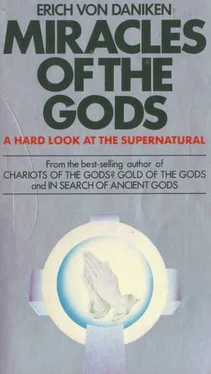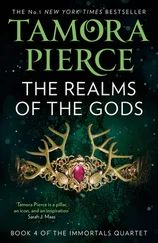Erich Daniken - Miracles of the Gods
Здесь есть возможность читать онлайн «Erich Daniken - Miracles of the Gods» весь текст электронной книги совершенно бесплатно (целиком полную версию без сокращений). В некоторых случаях можно слушать аудио, скачать через торрент в формате fb2 и присутствует краткое содержание. Жанр: Физика, на английском языке. Описание произведения, (предисловие) а так же отзывы посетителей доступны на портале библиотеки ЛибКат.
- Название:Miracles of the Gods
- Автор:
- Жанр:
- Год:неизвестен
- ISBN:нет данных
- Рейтинг книги:4 / 5. Голосов: 1
-
Избранное:Добавить в избранное
- Отзывы:
-
Ваша оценка:
- 80
- 1
- 2
- 3
- 4
- 5
Miracles of the Gods: краткое содержание, описание и аннотация
Предлагаем к чтению аннотацию, описание, краткое содержание или предисловие (зависит от того, что написал сам автор книги «Miracles of the Gods»). Если вы не нашли необходимую информацию о книге — напишите в комментариях, мы постараемся отыскать её.
Miracles of the Gods — читать онлайн бесплатно полную книгу (весь текст) целиком
Ниже представлен текст книги, разбитый по страницам. Система сохранения места последней прочитанной страницы, позволяет с удобством читать онлайн бесплатно книгу «Miracles of the Gods», без необходимости каждый раз заново искать на чём Вы остановились. Поставьте закладку, и сможете в любой момент перейти на страницу, на которой закончили чтение.
Интервал:
Закладка:
Let us consult Matthew, the toll collector (9:9) of the Sea of Genezareth, later an apostle and presumably an evangelist! Jesus went about 'all Galilee, teaching in their synagogues' (4:23), which housed the schools in those days. Synagogues came under priests and scribes. No one could just decide ex cathedra to teach there: he had to be examined by the scribes and recognized as one of them.
Where did Jesus get the audacity to criticize this guild on which his teaching activity depended:
'Except your righteousness shall exceed the righteousness of the scribes and Pharisees, ye shall in no case enter the kingdom of heaven' (5:20).
In his Gospel Matthew records speeches of Jesus which raise justifiable doubts about his meekness.
One recommendation from the mouth of the Son of God says: '... but whosoever shall say, Thou fool, shall be in danger of hell fire.' (5.22). If all Christians who cursed when they were angry were treated like? that, hell would be one gigantic crematorium.
In Chapter 5 Matthew quotes counsels that to the best of my knowledge even the most devout Christians of any age have never followed and, although they were divine commandments, could not follow: And if thy right eye offend thee, pluck it out and cast it from thee (30) ... whosoever shall smite thee on the right cheek, turn to him the other also (39). And if any man will sue thee at law, and take away thy coat, let him have thy cloak also (40). and whosoever shall compel thee to go a mile, go with him twain ...' (41).
I am always amazed when distorted quotations by the master are put in the appropriate passage of a
'story taken from everyday life' and then believed as 'God's word'. I have not met a single preacher who has taken these words literally.
Jesus repeatedly urges his hearers to speak clearly, they must never be 'lukewarm': 'But let your communication be, Yea, yea: Nay, nay: for whatsoever is more than these cometh of evil' (8:37). The Nazarene himself certainly does not follow his own advice for he speaks in veiled parables. For example, when Jesus healed a leper by laying his hands on him, he said (8:4): 'See thou tell no man', but adds in the same breath: '... go thy way, show thyself to the priest.' The original command to keep silence was pointless, because 'great multitudes' (8:1) were present at the miraculous cure. Yea-nay?
Nea!
Jesus asserted that he had not come to summon the righteous but the sinners to repentance: 'I will have mercy and not sacrifice.'
But according to Matthew, mercy is in short supply, because Jesus threatens even for minor sins: '...
the children of the kingdom shall be cast into outer darkness: there shall be weeping and gnashing of teeth' (8:12).
Love one another - love thy neighbour as thyself ... are the slogans under which the Christian churches have presented their doctrine to the people from the beginning down to today. Why and wherefore does not the Bible reader realize that Jesus simply became a Narcissus who did not follow these categorical imperatives in his own example-setting person? Jesus says: 'He that loveth father or mother more than me is not worthy of me: and he that loveth son or daughter more than me is not worthy of me' (10:37). Can all that be reconciled with 'God's word' or is the Son of God in need of love?
The citizens of Chorazin, Bethsaida and Capernaum presumably had not received Jesus and his disciples with due friendliness. As a result the Son of God unceremoniously condemned them to hell until the last judgment (11:20 et seq.).
Matthew, presumably chronicling accurately the deeds of the Son of God, had to write contradictions en masse. Jesus sent out his messengers with the exhortation:' ... be ye therefore wise as serpents, and harmless as doves' (10:16). That's what I call two-faced advice!
Then he prophesies that they 'shall be hated by all men for, my name's sake' (10:22), but need not fear death. Why does Jesus notify his companions of such a frightful fate, when soon afterwards he claims with raised voice: '... my yoke is easy, and my burden light' (11:30)? Even in those days, close to the ostensible events, it was not easy to reduce 'God's word' to a common denominator.
What is the point of a description by Matthew of a disgraceful injustice? 'And Jesus answered and spake unto them again by parables, and said (22:1): The kingdom of heaven is like unto a certain king, which made a marriage for his son (2).' This 'parable' introduces a fine wedding with a fine point. The wedding breakfast was ready, but the guests did not come. Again the king sent out messengers to invite the guests, but they spurned the invitation and even killed some of the messengers. Finally the king gave the order: 'Go ye therefore into the highways and as many as ye shall find, bid to the marriage' (9). People from the street were driven into the hall. 'And when the king came in to see the guests, he saw there was a man which had not a wedding garment...' (11). Wild with rage the king said: 'Bind him hand and foot, and take him away, and cast him into outer darkness: there shall be weeping and gnashing of teeth' (13). And the point of the parable that Jesus formulated? 'For many are called, but few are chosen' (14). Commentaries and recipes for evaluating sermons can twist and turn this example of God's word to their heart's content. To me as a simple Bible reader it remains an example of hideously asocial behaviour, I do not want any hints as to what is 'meant', I can read for myself.
Yet another story related by Matthew does not seem to me to be inspired by the divine spirit. I summarize the text, Chapter 25:14-30. In this 'parable' a rich man goes on a journey and before his departure entrusts his money to his servants. On his return they report to him. One, to whom his master had entrusted five talents (= a silver coin worth 6,000 drachmas), had used the time to make ten out of them. Nothing but praise! Another had made four talents out of the two given him to look after.
More praise! All of them had increased their capital except one. This man, obviously an anti-capitalist, had buried the talent in his fear. He gave back the one talent he had received. Then his master said:
'Thou wicked and slothful servant, thou knewest that I reap where I sowed not, and gather where I have not strewed (26). Thou oughtest therefore to have put my money to the exchangers, and then at my coming, I should have received mine own with usury (27). Take therefore the talent from him, and give it unto him which hath ten talents (28). For unto every one that hath shall be given, and he shall have abundance: but from him that hath not shall be taken away even that which he hath (29). And cast ye the unprofitable servant into outer darkness: there shall be weeping and gnashing of teeth (30).'
This story cannot suit the Jesus People with their ideology, of the anti-capitalist Jesus, but it is the lesson read in church on the 27th Sunday after Trinity. Capitalists of all countries, praise the divine word! Multiply your talents!
One last puzzle from Matthew (28:16-17). Eleven disciples (twelve minus Judas) climb the mountain near Galilee where Jesus had bidden them go. They saw him and worshipped him. 'But some doubted.'
Since my Bible studies I can find no answer to the question what they could have doubted when faced with a human being who had been crucified and buried, but now stood before them as large as life. Did they not believe their eyes. did they think he was a ghost?
St. Mark tells some remarkable stories. He states plainly that Jesus has brothers (3:31-32) who appeared on the scene with his mother when Jesus was sitting at table with his disciples.
The presence of the wonder-worker had spread abroad and crowds were gaping curiously in the street.
'When his friends heard of it' (3:21), they went out to lay hold of him, saying: 'He is beside himself.'
Читать дальшеИнтервал:
Закладка:
Похожие книги на «Miracles of the Gods»
Представляем Вашему вниманию похожие книги на «Miracles of the Gods» списком для выбора. Мы отобрали схожую по названию и смыслу литературу в надежде предоставить читателям больше вариантов отыскать новые, интересные, ещё непрочитанные произведения.
Обсуждение, отзывы о книге «Miracles of the Gods» и просто собственные мнения читателей. Оставьте ваши комментарии, напишите, что Вы думаете о произведении, его смысле или главных героях. Укажите что конкретно понравилось, а что нет, и почему Вы так считаете.











